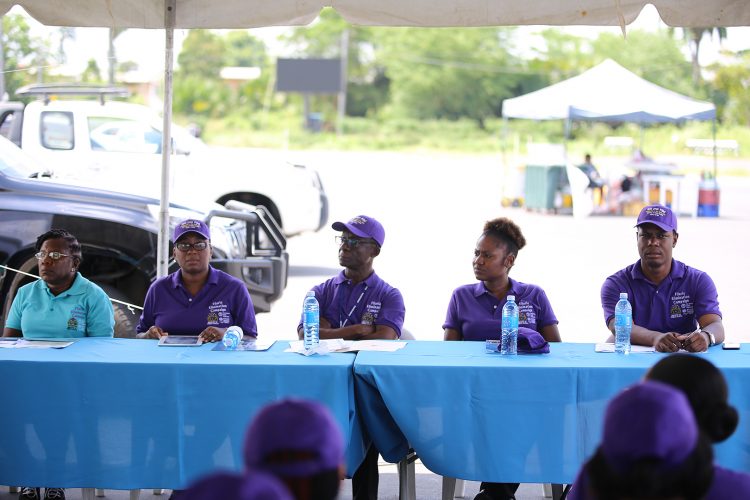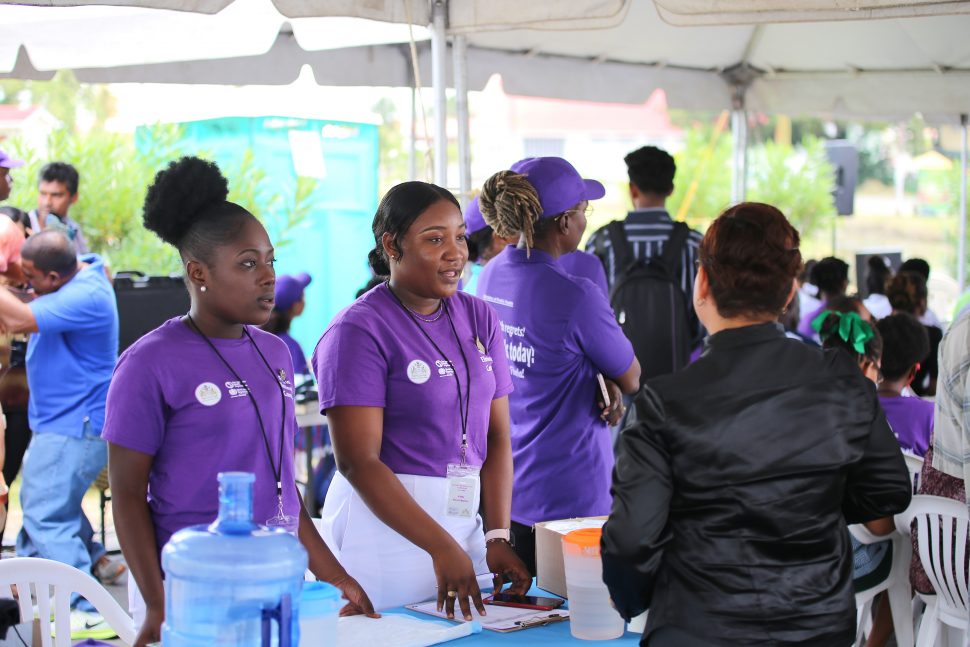With the aim of eliminating lymphatic filariasis by 2027 and following the achievement of 86% coverage for last year, the Ministry of Public Health yesterday launched the Mass Drug Administration (MDA) campaign.
The programme, which was officially launched at the Square of the Revolution, will target four of the ten administrative regions; namely Regions Three, Four, Five and Ten, and will see the distribution of the de-worming tablets to effectively contain and interrupt the spread of the disease.
Delivering the feature address, Dr Quincy Jones, Regional Health Officer (RHO) of Region 4, said globally and nationally, too many persons are infected with lymphatic filariasis and are obligated to endure its social and economic ills.

Having been in contact with persons living with the disease, Jones said he understands how disheartening and incapacitated one can be feel as its physical disability, sadly brings undue social stigma. “Consequently, I am pleased to be a part of today’s activity which signals that this neglected tropical disease is of high priority on our national public health agenda as we will not allow lymphatic filariasis and its associated ills to perpetuate in Guyana,” Jones said.
According to Jones, the World Health Organization (WHO) and Guyana’s undertaking to eliminate lymphatic filariasis is a costly one which requires intensive fiscal and technical resources. “But the social and economic benefit that we have on the elimination of lymphatic filariasis, far outweigh the cost,” he noted.
Over the past years, Jones said, the implementation of the MDA programme to eliminate lymphatic filariasis has gained momentum and garnered success. “I have marveled at the fluidity at which, both those at the helm of the programme, and those grass root implementers, adapt best practices and lessons learnt not only from the past year’s success but from the previous day of pill distribution to ensure that no pill is left behind and all is reached,” he explained.
He added that the evidence is present that the elimination of lymphatic filariasis in Guyana is not an elusive dream but a real possibility. “And someday an event like this will be held to declare that lymphatic filariasis is no longer a public health problem but has been arrested, convicted and sentenced to banishment,” Jones declared. He added that the other regions are not forgotten.
PAHO/WHO country representative Dr William Adu-Krow urged persons to be alert since it is important to note that the disease can go hidden for many years. “We sometimes feel, yes, we are okay so there is no need to worry but there is a need to,” he said.
He said there are also several issues that should be seriously considered such as the effects, stigma, and suffering attached. He noted that more needs to be done to ensure that the disease is fully eliminated.
According to Adu-Krow, 97 million cases around the world have gotten treatment so far. “MDA is a WHO recommended preventative chemotherapy. And it’s a strategy to stop transition of your infection. MDA involves treatment of all eligible persons living in endemic areas,” he said.
In the Americas, he explained, MDA was required in four endemic countries in 2015. These countries were Brazil, the Dominican Republic, Haiti and Guyana.
“In Guyana, PAHO has been pleased to support the country to extend the MDA from two endemic regions in 2014 to four in 2016. The numerological coverage has passed from 45.7% in 2015 to 54.2 in 2016,” Adu-Krow related while stressing that the overall pass mark of 65% has not been attained.
While the MDA campaign will be done in Regions Three, Four, Five and Ten, the situation is being reassessed in the remaining regions in order to consider scaling up the campaign.
Meanwhile, National Coordinator – Neglected Infectious Diseases, Dr Fabu Moses, said that despite the successes, Guyana lags behind in the fight against the elimination of the disease. “We are the only country in the Americas yet to scale up to 100% geographical coverage,” she stressed.
“I believe that we can do it and there is no better way to make our own pronouncement to resolve, to eliminate lymphatic filariasis from Guyana than by our own community efforts. We must put the safety of our at-risk population at the helm of everything that you do and for that reason, we do not leave pills behind,” she said.
To achieve the goals, Moses said, it takes commitment from a wide range of stakeholders. “It takes many years of dedicated efforts, education and strong communication to get this done. It takes constant vigilance to ensure that our current patients are all known and have access to the best care possible. But most of all it takes people,” she said.






